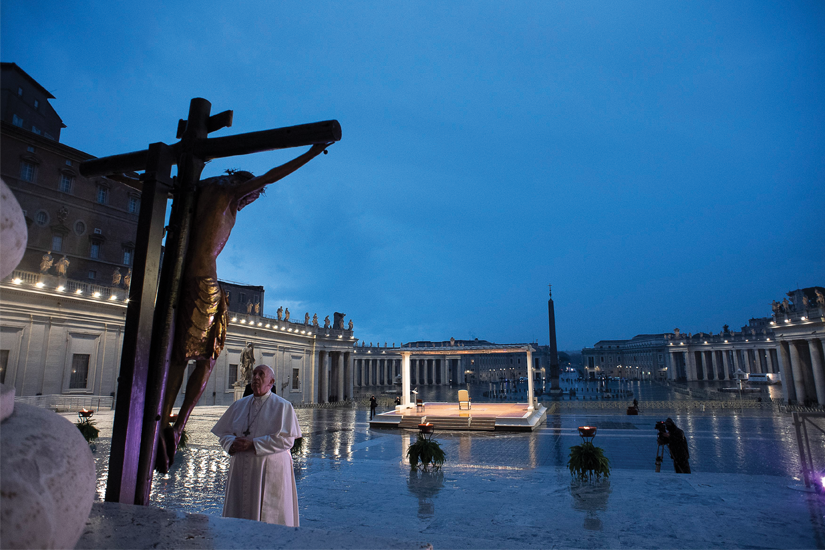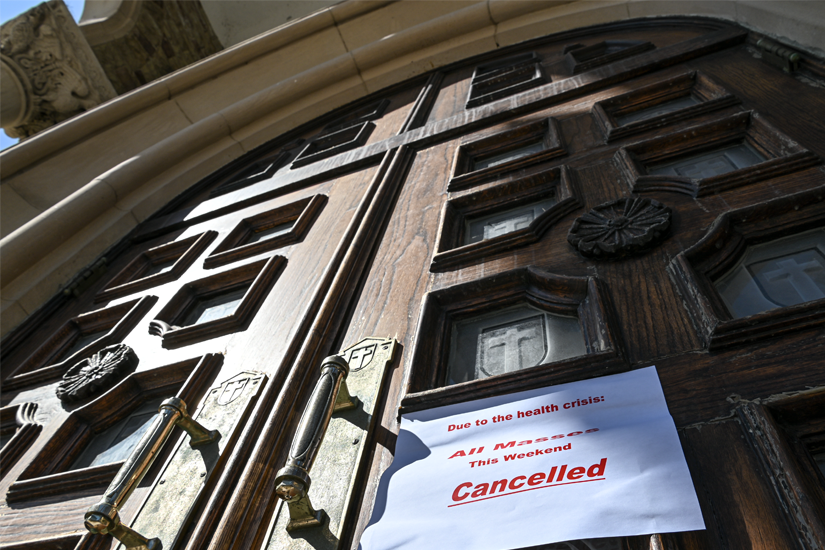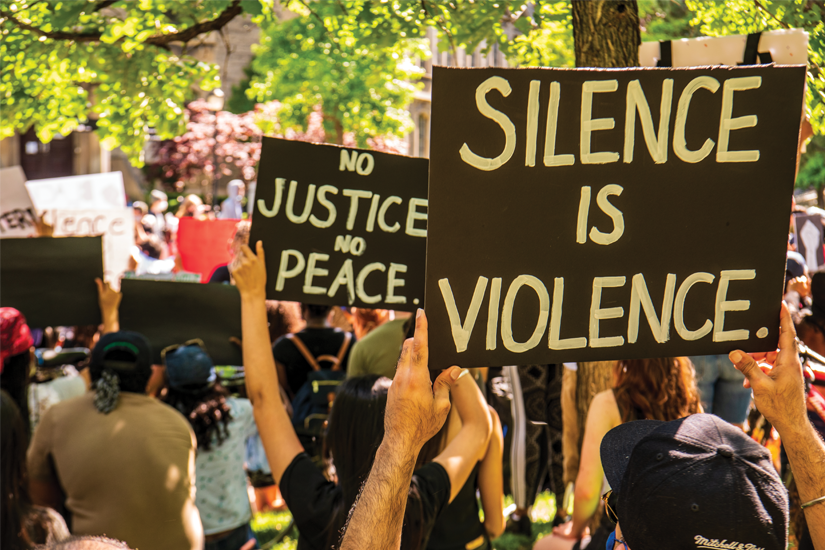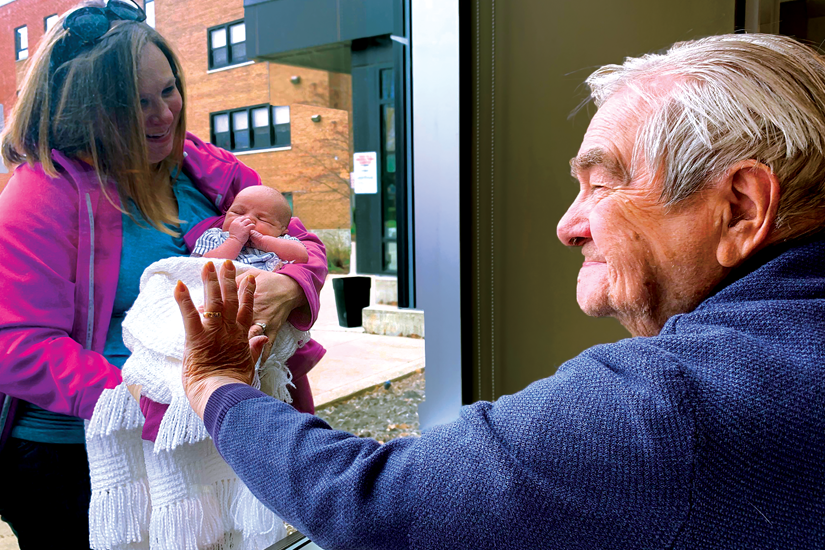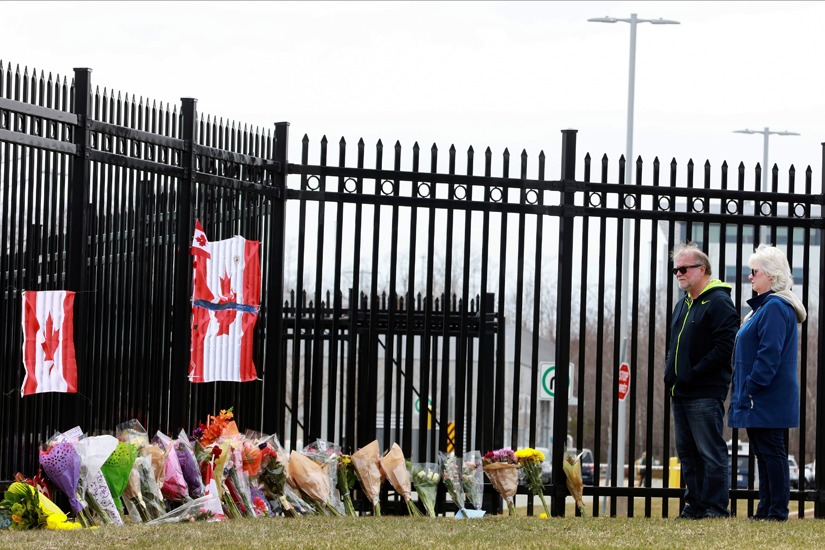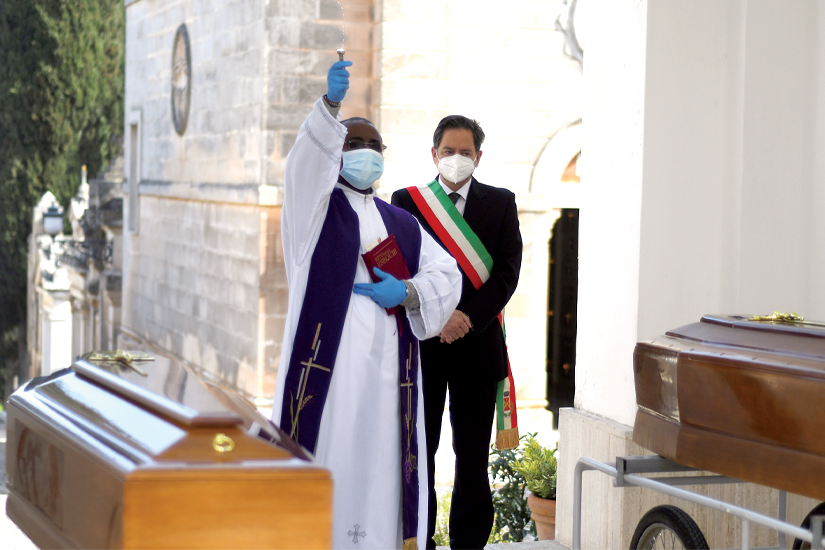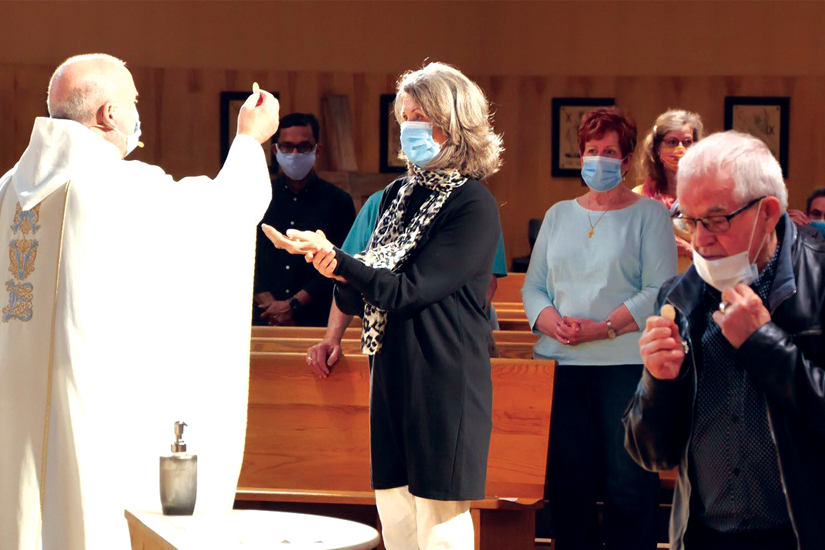This unforgettable year, this annus horribilis, is mercifully drawing to the end, but the virus that has so consumed our lives is not.
With over 14,000 deaths in Canada and 1.7 million around the globe, there is a question from the 16th-century Book of Common Prayer that speaks to us: “In the midst of life we are in death, of whom may we seek for succour?”
We are in the midst of death. We should be in the midst of grief.
We are tempted toward hope as we see pictures and video of arms being pierced with syringes full of COVID-19 vaccine, but have we really begun to grieve all that we’ve lost?
Some of us don’t know anyone who has died or been hospitalized by our plague. But even if you didn’t know Jesuit art historian Fr. Peter Larisey, or the four other Jesuits who died at Rene Goupil House east of Toronto in the spring, it’s not hard to see what we have lost.
“There is a wholeness in a work of art,” Larisey told this reporter in 2011. “When something is out of place or missing, you are aware of it. In dealing with spiritual direction or counselling — I like the French word, l’accompagnement spirituel — in dealing with this, it’s paying attention to the wholeness and noticing where the irregularity is.”
We were more whole with Larisey among us. The same is true of so many friends and family members who have died.
As COVID-19 patients died alone in hospital beds in March and April, with nothing but FaceTime to connect them to their families, the family of faith also found itself disconnected from the body of Christ in the Eucharist. Churches were locked tight in much of the country in the spring, opened to limited seating and safety protocols through the summer, but then were shut again as the second wave began to overwhelm hospitals.
Mostly, our COVID crisis of 2020 has played out on screens (television, computer, phone) — the same places where we watched Netflix and filled endless hours in isolation or lockdown. This is no way to grieve. It is rather pushing grief aside, hoping it will go away.
At the end of March, as the virus was filling hospitals and morgues in Italy, as Romans came out to their balconies every evening to sing and applaud their nurses, doctors and ambulance drivers, Pope Francis stood alone in a rain-soaked St. Peter’s Square, teaching the world how to grieve — teaching us that our grief is never separated from hope.
“In the midst of isolation, when we are suffering from a lack of tenderness and chances to meet up, and we experience the loss of so many things,” he said, “let us once again listen to the proclamation that saves us: He is risen and is living by our side.”
To grieve is to embrace Christ on the cross, said the Pope. “Embracing the Lord in order to embrace hope — that is the strength of faith, which frees us from fear and gives us hope.”
Hope seems almost foreign to us in a year when the world has seemed to mock Christian hope so many times over.
First there were the disturbing revelations in February that L’Arche founder and Canadian Jean Vanier, who died in 2019, had sexually abused six women.
Then there was the Vatican’s McCarrick report in November, which laid bare the damning trail of facts of an abuser who managed to rise through Church ranks to become Cardinal Theodore McCarrick before finally being held to account and laicized. Less than a month later, Judge Pepita Capriolo’s report on the 24-year career of Brian Boucher as a priest in Montreal exposed a Church that coddled a heartless narcissist through decades, failing to admit it had ordained a man unfit for priesthood. He wound up being sentenced to prison for sexually abusing boys.
“Many people had complained about Boucher’s unacceptable behaviour over the years: he was rude, authoritarian, overly intense, intransigent, homophobic, racist, misogynist and verbally, and sometimes even physically, aggressive. These reports were repeatedly reported to his superiors,” Capriolo wrote.
These stories of betrayed trust have followed Catholics for decades. Where is the hope that this will end?
“Why do I hang in there?” abuse expert Sr. Nuala Kenny asks herself. “Because the Church is not the organization and structure of the Church. An organization needs structure, needs authority. But the Church is the body of Christ.”
In grief, we cling to the body.
“I can’t breathe,” said George Floyd on May 25, with a white police officer’s knee pressing down on his neck.
After Floyd’s death played out on a Minneapolis street, the grief of nations played out on city streets around the world as Black Lives Matter emerged as a force for change.
“These protests reflect justifiable anger and frustration,” Vancouver Archbishop Michael Miller wrote in a pastoral letter June 7. “Racist attitudes and discrimination have been tolerated for far too long.”
“Satan is behind racism,” Toronto Catholic Audrey Johnson told The Catholic Register. “I know how wicked Satan is. Racism is a spirit. Racism is an evil, wicked spirit.”
Johnson had Pope Francis on her side.
“We cannot close our eyes to any form of racism or exclusion, while pretending to defend the sacredness of every human life,” Pope Francis said.
We saw a spirit of hate at large in rural Nova Scotia April 18-19. Gabriel Wortman began by assaulting his girlfriend and ended by killing 22 people.
“When something like this happens, what can you do? You can pray or you can just dwell on it. Prayer seems to be more productive,” Catholic Register columnist Frank Campbell said while he was reporting on the aftermath for the Halifax Chronicle Herald.
The planet itself has given us reasons to grieve this year. We began 2020 with unprecedented wildfires out of control across Australia — the “Black Summer.” By March 9 there were 186,000 square kilometres of bushland charred and smouldering, 34 people killed and nearly three billion animals dead.
The U.S. lost over 1,600 sq. km in its worst wildfire season on record. Thirty named storms raged through the Atlantic, 13 of them hurricanes. On the last day of October, Development and Peace partners in Honduras were watching communities where they live and serve torn apart by Hurricane Eta, which killed 189 people.
Canada’s Arctic continued to feel the sting of climate change. Arctic sea ice was at record low levels in October. In November we had 1.71 million square kilometres less ice than the 1981 to 2010 average. By December, Ottawa had a plan to reduce Canada’s greenhouse gas output to 40-per-cent below our 2005 levels by 2030, built on a strategy of an aggressive carbon tax. Will it be enough to address the sustainability of our common home?
“The protection of the home given to us by the Creator cannot be neglected,” Pope Francis told a gathering of diplomats Jan. 9. “Young people are telling us that this cannot be the case, for at every level we are being urgently challenged to protect our common home.”
It is true of every election that democracy is on the ballot. Democracy is the system of government that tests itself regularly against the humanity, forbearance, wisdom and goodness of those who are governed. Our faith in democracy — and so our faith in one another — has been tested in 2020.
Donald Trump is still claiming to have won an election he clearly lost, though perhaps to less effect than Alexander Lukashenko’s absurd insistence that he won over 80 per cent of the votes cast in Belarus in August. While Trump flails away in the courtrooms of the United States, Lukashenko still commands the Predator water cannons that prowl the streets of Minsk — cannons he bought from Guelph, Ont.-based Streit Group.
Canada’s industrial ingenuity also found an outlet in the skies over Nagorno Karabakh. Azerbaijan found Burlington, Ont.’s L3Harris Wescam targeting systems useful in their campaign to bomb the Armenian population out of their homes, at least until Ottawa suspended the systems’ export in October after issuing export permits in May.
The bargains we already have with the environment and Indigenous Canadians were sorely tested when, from January through March, native Canadians shut down rail lines across the country to keep a pipeline from proceeding through Wet’suwet’en territory in B.C.
Authoritarians around the world long ago decided Pope Francis was their enemy. In Brazil, President Jair Bolsonaro lashed out at the spiritual leader of more than two-thirds of his country’s population.
“Well, the Pope may be Argentinian, but God is Brazilian,” said the man who has presided over a shocking 85-per-cent increase in Amazon deforestation.
In October, Pope Francis answered the authoritarian populists scattered across the globe. In the papal encyclical Fratelli Tutti, Francis laid out a Catholic vision for a deeper understanding of democracy. The cultural anchor of democracy begins in our encounter with other people, said the Pope.
“Isolation and withdrawal into one’s own interests are never the way to restore hope and bring about renewal,” Pope Francis wrote. “Rather, it is closeness; it is the culture of encounter. Isolation, no; closeness, yes. Culture clash, no; culture of encounter, yes.”
Meanwhile in Canada, our politicians and our courts have further entrenched the offer of death as an alternative to the disabled and the suffering. Bill C-7 ,expanding the qualification for assisted suicide, has passed the House and will likely be the law in 2021.
Many year-in-review stories for 2020 will be just lists of disasters — the Jan. 8 downing of Ukraine International Airlines Flight 752, which claimed the lives of 57 Canadians over Iran, the massive May 29 Norilsk oil spill, the Aug. 4 port explosion in Beirut, the Nov. 4 outbreak of civil war in Ethiopia. In some year-end reviews these will be balanced against a few happy events — eradication of wild polio in Africa through vaccination, the plucky Perseverance rover mining the surface of Mars for signs of life, a drop in greenhouse gas emissions in Canada. But wisdom demands we do more than tick off events.
Learning to grieve could be our best news story of 2021. Rather than lists of passing events, a healthy grief can put our lives in context. For Catholics, to grieve is to acknowledge our losses in the midst of Christian hope.
“Hope speaks to us of a thirst, an aspiration, a longing for a life of fulfillment, a desire to achieve great things, things that fill our heart and lift our spirit to lofty realities like truth, goodness and beauty, justice and love,” wrote Pope Francis in Fratelli Tutti. “Hope is bold; it can look beyond personal convenience, the petty securities and compensations which limit our horizon, and it can open us up to grand ideals that make life more beautiful and worthwhile.”


